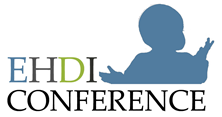| ABSTRACT INFORMATION |
| Presenter Information: |
| Presenter 1: |
Name: Karen Munoz
Affiliation: NCHAM
Karen Muñoz, Ed.D., CCC-A is an assistant professor of audiology at Utah State University in the Department of Communicative Disorders. Her focus is pediatric audiology and she has been actively involved in efforts to support the early identification and management of hearing loss in children. In addition to her faculty appointment, Karen also serves as a deputy director of the National Center for Hearing Assessment and Management at Utah State University. Karen’s background includes 15 years of pediatric audiology experience. She is involved in outreach to improve pediatric audiology services at the local, state, national, and international level.
|
| Presenter 2: |
Name: Richard Harward
Affiliation: Utah Department of Health
Richard Harward is currently the Director of the EHDI Program in Utah and the Program Manager for the Utah Department of Health's Specialty Services Program within the Children with Special Health Care Needs (CSHCN) Bureau. The Specialty Services program includes Hearing, Speech, Vision, Physical Therapy, Occupational Therapy, and Transition Services. He is also the Program Manager for the UDOH Child Health Advanced Records Management Project (CHARM), which involves the development of an integrated data sharing network to track and monitor outcomes for Utah children and their families. He has adjunct faculty appointments in the Communicative Disorders Department at Utah State University, and at the University of Utah School of Medicine. Additionally, he is the Discipline Coordinator for Audiology with Utah's Regional Leadership Education in Neurodevelopmental Disabilities Program.
|
|
| Author Information: |
| Author 1: |
Name: Karen Munoz
Affiliation: NCHAM
|
| Author 2: |
Name: Richard Harward
Affiliation: Utah Department of Health
|
|
| Abstract Information: |
| Title: |
Learning How to Make the EHDI Connections on TIme |
| Primary Track: |
7-Program Evaluation and Quality Assurance
|
| Keyword(s): |
quality assurance, diagnostics, amplification, early intervention |
Abstract: |
Newborn hearing screening has become a standard of care in the United States, with currently over 95% of infants being screened for hearing prior to hospital discharge. However, according to data from the CDC, for 60% of the children referred nationally for further testing, there is no documentation of follow-up in state EHDI programs. To address this critical concern with follow-up, more information is needed. The timeliness of intervention is crucial to maximize developmental outcomes. The earlier intervention is received the better for the child’s development. The goals promoted by the Maternal and Child Health Bureau and the Joint Committee on Infant Hearing state diagnostic testing should be completed by three months of age and amplification should be fit within one month of diagnosis.
To gain a better understanding of these outcomes in Utah, parents were sent a survey to find out age of identification, age of amplification, and age of entry into early intervention. The survey was sent to two groups (1) children with confirmed hearing loss (131 surveys mailed; 27% response rate), and (2) children who failed the screening and were in the diagnostic process, but no final testing was submitted to the state Department of Health(174 mailed, 11% response rate). Findings will be discussed. Insights identified from parent comments included concerns such as, inadequate provision of information to help them understand the next step in the process; existence of numerous delays within the system; inadequate communication among professionals providing services, and inconsistent knowledge among professionals of what is needed. Lessons learned will be shared as well as suggestions for addressing concerns raised. |
| Presentation(s): |
Not Available
|
| Handouts: |
Not Available
|
|

